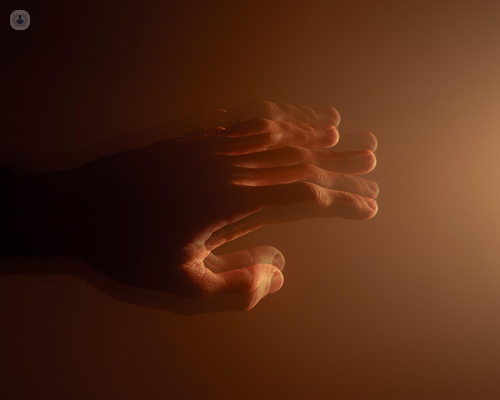Movement disorders: More than just Parkinson's
Written by:Parkinson’s disease is a commonly-known movement disorder and celebrities like Muhammad Ali, Ozzy Osbourne and Michael J. Fox have raised awareness of this neurological condition. However, did you know that there are many more movement disorders?
The term is used to refer to a group of neurological conditions that cause either increased, reduced or slow movements which are either voluntary or involuntary. Here to provide a detailed look at different movement disorders is leading consultant neurologist Dr Daclav Dostal.

What are movement disorders?
The term ‘movement disorders’ refers to a group of nervous system (neurological) conditions that affect the ability to perform usual movements including walking, using hands etc. Movement disorders can cause reduced or slow movements or on the contrary; involuntary movements, like tremor.
What are the different types of movement disorders?
The different types of movement disorders are:
-
Ataxia
Ataxia affects the cerebellum, the area of the brain which controls co-ordinated movement. It may lead to uncoordinated or clumsy balance, speech or limb movements, alongside other symptoms.
-
Cervical dystonia
Spasms and intermittent contractions of the neck muscles are symptoms of this movement disorder. The cause the neck to move and turn in different ways.
-
Chorea
The characteristics of chorea are repetitive, brief, irregular, somewhat rapid involuntary movements. They typically involve the face, mouth, torso and limbs.
-
Dystonia
Sustained involuntary muscle contractions with twisting, repetitive movements are involved in dystonia. The entire body may be affected, which is known as dystonia, or a part of the body (focal dystonia) can be affected.
-
Functional movement disorder
This condition may resemble any of the movement disorders, but it isn’t due to neurological disease.
-
Huntington's disease
Huntington’s disease is an inherited, progressive neurodegenerative disorder. It causes uncontrolled movements in the form of chorea, impaired cognitive abilities and psychiatric conditions.
-
Multiple system atrophy
This is a progressive neurological disorder that affects many brain systems and can cause low blood pressure alongside impaired bladder function. It causes other movement disorders such as ataxia or Parkinsonism.
-
Myoclonus
Myoclonus causes lightning-quick muscle jerks, specifically affecting one or a group of muscles.
-
Parkinson's disease
This is a progressive, neurodegenerative disorder that causes tremor, rigidity, or stiffness, alongside slow-decreased movement (bradykinesia) or imbalance. It may also cause other non-movement symptoms.
-
Parkinsonism
A group of conditions that has symptoms similar to Parkinson’s disease.
-
Progressive supranuclear palsy
Progressive supranuclear palsy is rare and causes walking, balance and eye movement problems. It’s a distinct condition but it may resemble Parkinson’s disease.
-
Restless legs syndrome
The symptoms of restless legs syndrome causes unpleasant, abnormal feelings in the legs while relaxing or lying down. This is often relieved by movement.
-
Tardive dyskinesia
Long-term use of certain drugs called neuroleptic drugs, which are used to treat psychiatric conditions cause tardive dyskinesia. The symptoms of this neurological condition cause repetitive and involuntary movements such as grimacing, blinking and other movements.
-
Tourette syndrome
Tourette syndrome begins between childhood and teenage years. It’s associated with repetitive movements, like motor tics, and vocal sounds.
-
Tremor
Involuntary rhythmic shaking of body parts such as the hands, head and other parts of the body occur. The most common type is essential tremor.
-
Wilson's disease
Excessive amounts of copper build up in the body with Wilson’s disease, causing neurological problems.
What are the most common types of movement disorders?
The most common movement disorder is Parkinson disease, a chronic neuro - degenerative condition caused by reduced level of dopamine. The term parkinsonism refers to group of similar condition caused by another reason.
How important is correct diagnosis of movement disorders?
It is obvious from the list of common types of movement disorders that they are diverse in their presentation. The process of establishing the proper type of movement disorder in case of each patient and its cause, may take a long time. It can involve number or tests including blood tests, brain scanning or other tests. It’s important to diagnose the condition properly as correct diagnosis of movement disorders is paramount for treatment.
If you’d like to know more about movement disorders, or require expert specialist help, arrange an appointment with Dr Dostal via his Top Doctors profile.


